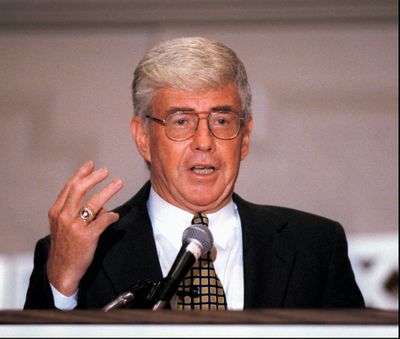Former congressman Jack Kemp dies at 73
Ex-quarterback was supply-side advocate

WASHINGTON – Jack Kemp, a star quarterback with the Buffalo Bills who became a spokesman for supply-side economics, a secretary of Housing and Urban Development and a candidate for high national office, died Saturday at his home in suburban Bethesda, Md. He was 73.
A former aide said he died of cancer. He had announced in January that he had been diagnosed with the illness.
Kemp was a Republican congressman from upstate New York for nine terms in the 1970s and 1980s. On the powerful Appropriations and Budget committees, he tirelessly pitched the idea that tax cuts and economic growth were more important to America’s prosperity than controlling deficits.
Kemp had twice sought the GOP presidential nomination. He ran for vice president in 1996 on the Republican ticket headed by Sen. Bob Dole, R-Kansas. He was picked in large part because of his advocacy of low taxes.
In Congress, he and Sen. William Roth, R-Del., pushed through a 33 percent tax cut over a three-year period that was regarded as a linchpin of Reagan administration tax policy.
It represented supply-side theory, according to which lower taxes meant more growth.
In Kemp’s 1979 book, “An American Renaissance: a Strategy for the 1980s,” he adopted John F. Kennedy’s idea that “a rising tide lifts all boats.”
Kemp was regarded as an unusual sort of Republican, combining fiscal and social conservatism with support for civil rights, affirmative action and rights for illegal immigrants. He called himself “a bleeding-heart conservative.”
After becoming HUD secretary in 1988, he worked to root out discrimination by lenders and insurers. He ended some programs, tightened up others and energized the staff.
He was an early advocate of plans to attract business to distressed neighborhoods with tax-free zones.
Jack French Kemp Jr. was born in Los Angeles on July 13, 1935. He graduated from Occidental College, where he quarterbacked and captained the team, and led the nation’s small colleges in passing.
He played in the Canadian Football League from 1958 until 1960, when the American Football League was formed.
The Los Angeles (later, San Diego) Chargers signed him. In 1961, his hand was broken during a game; it was reset in a football grip, with one finger permanently curved.
After a long recovery from a shoulder injury, Kemp returned to the field with the Bills and led them to their first winning season. In 1964 and 1965, he led the team to the AFL Championships. He won the AFL’s player of the year award in 1965.
Kemp also co-founded and served five terms as president of the AFL Players’ Association.
Off-season jobs, including one as an intern to then-California Gov. Ronald Reagan, helped him develop conservative credentials.
As a Republican congressman, he defied conservatives by pushing sanctions against South Africa. As HUD chief, he put the interests of poor tenants over housing developers. And as a vice presidential nominee, he campaigned hard for African -American votes his ticket had little hope of winning.
By 1970, Kemp left football and ran successfully for an open House seat in a district that included suburban Buffalo.
In 1988, Kemp challenged Vice President George H.W. Bush for the Republican nomination for president. Kemp failed to gain traction and withdrew. Bush won the election and appointed Kemp to his Cabinet.
After four years at HUD, Kemp co-founded Empower America, a public policy and advocacy organization, joined the Heritage Foundation and became a visiting fellow at the Hoover Institution. He ran briefly for the 2000 presidential nomination, and then served on corporate and institutional boards.